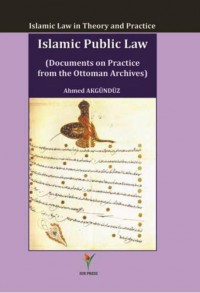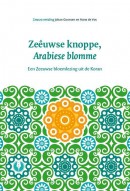Product informatie
- ISBN 9789081726436
- ISBN 10 9081726439
- Druk 1
- Bindwijze Paperback
- Taal Engels
- Uitgever Multilibris, Uitgeverij
- Onderwerp Islam
- Beschikbaar sinds 24 Februari 2012
Samenvatting
Islamic law contains explications and divisions that imply a classification in terms of public and private law. In this book we will explain the outlines of Islamic public law, e.g. First Chapter; Islamic constitutional law (al-siyasah al-shar'iyyah) and administrative law (al-siyasah al-shar'iyyah); Second Chapter; penal law (al'-uqubat); Third Chapter; financial law (zakat, 'ushr, haraj and other taxes); Fourth Chapter; trial law (qada), and Fifth Chapter: international public law (al-siyar). The fields of especially Islamic constitutional law, administrative law, financial law, ta'zir penalties, and arrangements concerning military law based on the restricted legislative authority vested by Shari'ah rules and those jurisprudential decrees based on secondary ... sources like customs and traditions and the public good (maslahah) all fell under what was variously called public law, al-siyasah al-shar'iyyah (Shari'ah policy), qanun (legal code), qanunnamah, 'orfi huquq etc. Since these laws could not go beyond Shari'ah principles either, at least in theory, they should not be regarded as a legal system outside of Islamic law. But Islamic penal law, financial law, trial law, and international law depend mostly on rules that are based directly on the Qur'an and the Sunnah and codified in books of fiqh (Islamic law) called Shari'ah rules, Shar'-i sharif, or Shari'ah law. Such rules formed 85% of the legal system. In this book, we will focus on some controversial problems in the Muslim world today, such as the form of government in Islamic law and the relation between Islam and democracy. Islamic law does not stipulate a certain method of state government; nonetheless, we may say that the principles it decrees and its concept of sovereignty suggest a religious republic. As a matter of fact, Hulafa al-Rashidun (the Rightly Guided Caliphs), were both caliphs and religious republican presidents.We could say that this book has three main characteristics. i) We have tried to base our explanations directly on the primary Islamic law sources. For example, after reading some articles on the caliphate or timar system in articles or books by some Western scholars and even by some Muslim scholars, one might conclude that there are different views on these subjects among Muslim scholars. This is not true: Muslisms have agreed on the basic rules on legal subjects, but there are some conflicts regarding nuances and interpretations. If one reads works by Imam Gazzali, Ibn Taymiyyah, al-Mawardi, and al-Farra', one will not find any disagreement on the main rules, but there are some different interpretations of some concepts. We have tried to discover where they agreed and we have sometimes pointed to where they differed.ii) We have researched practices of Islamic law, especially legal documents in the Ottoman archives. For example, we explain hadd-i sariqa but also mention some legal articles from the Ottoman legal codes (qanunnames) and some Shari'ah court decisions like legal decrees (i'lamat-i shar'iyyah). It is well known that nobody can understand any legal system without implementing and practicing it. That also holds for Islamic law because theory alone does not yield a complete understanding of Shari'ah rules. iii) We have worked hard to correct some misconceptions and misunderstandings about Islamic law. That is why we appeal to the primary sources. For example, some scholars claim that the Hanafi jurist Imam Sarahsi did not accept the idea of punishment for apostasy. We have studied his work al-Mabsut and found this claim to be unfounded. The comparison between timar and fief is another example because the timar system is different from the fief system. Some scholars confuse the concept of sovereignty and governance. The Islamic state is not a theocratic state in the sense in which Europeans understand the term.
Meer boeken van uitgever Multilibris, Uitgeverij
Meer boeken met de onderwerpen Islam
Veel gestelde vragenmeer antwoorden
Hoe werkt Resale.nl?
Je kunt op de website advertentie(s) plaatsen van de boeken die u wilt verkopen. Een potentiële koper neemt dan contact met je op om samen een prijs af te spreken en de transactie verder af te handelen. Houdt hierbij onze aanbevelingen voor een veilige transactie in gedachten en voorkomt dat je slachtoffer wordt van oplichting.
Hoe kom ik in contact met de verkoper?
Je kunt een reactie versturen door bij de betreffende advertentie van de verkoper op de knop ‘doe een bod’ te drukken. Je kunt nu een bod doen op de advertentie en een persoonlijk bericht toevoegen. Het verstuurde bod brengt je in contact met de verkoper via e-mail.
Wat zijn de kosten voor het verkopen van mijn studieboeken?
Je kunt geheel gratis gebruik maken van de diensten van Resale.nl. Resale.nl haalt zijn inkomsten uit advertenties.
Hoe kan ik een boek kopen?
Resale.nl werkt globaal op de volgende manier:
- Zoek via het zoekveld het studieboek dat je wilt kopen.
- Uit de zoekresultaten kies je het studieboek waar je geïnteresseerd in bent.
- Op de detailpagina van het studieboek kun je een overzicht vinden van de personen die het studieboek verkopen.
- Je kunt nu een bod plaatsen door op de button te klikken. Het bod wordt via e-mail aan de verkoper verzonden.
- De verkoper van het studieboek neemt contact met je op door een reactie te geven op het bod dat je hebt verzonden. Met de verkoper kun je gezamenlijk een prijs afspreken. Houdt hierbij onze aanbevelingen voor een veilige overdracht in gedachten en voorkom dat u slachtoffer wordt van oplichting.
Hoe weet ik wat ik koop?
Om te achterhalen of wat je koopt ook daadwerkelijk is wat er wordt geadverteerd is het verstandig om bij de verkoper langs te gaan en het aangebodene te bezichtigen. Doe je dit niet, dan loopt je een zeker risico. Onder het kopje ‘Hoe kan ik de kans op misbruik verkleinen’ kun je meer over dit onderwerp vinden.
Kopers over Resale.nl
bart van gijsel
"Ik ben erg tevreden over deze verkoper de familie thus. Goede snelle levering."
Patrice Michel
"De verkoper heeft er alles aan gedaan om het door mij bestelde product zo snel mogelijk naar mij toe te krijgen. Heeft me van iedere stap op de hoogte ..."
marjolein
"Besteeling snel bezorg, in goede staat net zoals beschrijving en goede communicatie met verkoper!"
marjolein
"Goed contact, snel en in goede orde ontvangen. Staat van het boek was zo goed als nieuw!"
hilda1
"goede medewerking en hulp dank u wel"
Tineke
"Het bestelde werd netjes en snel afgeleverd. De prijs was goed."
stacy
"Goed verpaktBoek ziet er mooi uit"
elisa
"Goede levering alleen jammer dat er niet bij was gezet dat er al in geschreven was"
Elly
"Verkoper reageerde snel op mijn emails en heeft ook het boek snel opgestuurd.Het boek was niet van nieuw te onderscheiden. Was waarschijnlijk niet gebruikt. ..."
Gerard+[2]
"Prettig contact gehad en goed zaken kunnen doen."
















